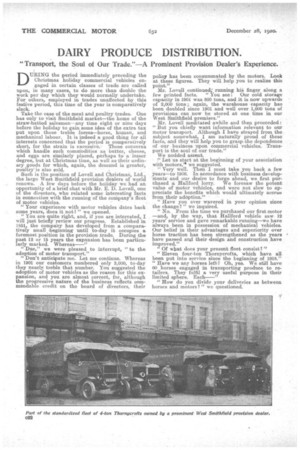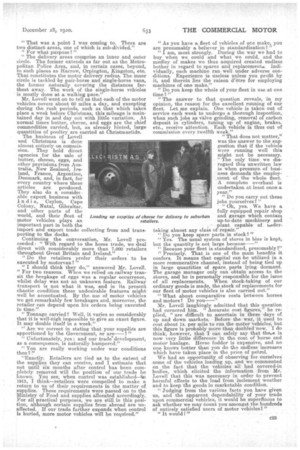DAIRY PRODUCE DISTRIBUTION.
Page 8

Page 9

If you've noticed an error in this article please click here to report it so we can fix it.
" Transport, the Soul of Our Trade."—A Prominent Provision Dealer's Experience.
DURING the period immediately preceding the Christmas holiday commercial vehicles engaged in certain classes of trade are called upon, in many cases, to do more than double the work per day which they would normally undertake. For others, employed in trades unaffected ibythis festive period, this time of the year is comparatively slack.
Take the case of the meat and poultry trades. One has only to visit Smithfield market—the home of the straw-hatted salesmen—any time eight or nine days before the holiday to gain some idea of the extra tax put upon those treble forces—horse, human, and mechanical labour. It is indeed a good thing for all interests concerned that the period is comparatively short, for the strain. is excessive. Those concerns which handle such commodities as butter, cheese, and eggs are similarly placed, perhaps to a lesser degree, but at Christmas time, as well as their ordinary goods for which, again, the demand is greater,
poultry -is also sold. .
Such is the position of Lovell and Christmas, Ltd., the large West Smithfield provision dealers of world renown. A few days before the holiday we had an opportunity of a brief chat with Mr. E. D. Lovell, one of the directors who related sonic interesting facts in connection with the running of the conapany's fleet of motor vehicles.
" Your experience with motor vehicles dates back some years, does it not? " we opened.
"You are quite right, and, if you are interested, I will just brietly-review our progress. Established in 1851, the company has developed from a comparatively small beginning until to-day it occupies a foremost position in the provision trade. During the past 12 or 15 years the expansion has been particularly marked. Whereas—"
"Due," we were pleased to interrupt, "to the adoption of motor transport."
" Don't anticipate me. Let me continue. Whereas in 1901 our customers numbered only 33000, to-day they nearly treble that number. You suggested the adoption of motor vehicles as the reason for this expansion, and you are almost correct, far, although the progressive nature of the business reflects commendable credit on the board of directors, their policy has been consummated by the motors. Look at these figures. They will help you to realize this point." Mr. Lovell continued; running hia. finger along a few printed facts. "You seel Our cold storage capacity in 1901 was 800 tons, and it is now upwards of 2,000 tons; again, the warehouse capacity has been doubled since 1901 and well over 1,000 tons of provisions can now be stored at one time in our West Smithfield premises."
Mr. Lovell meditated awhile and then proceeded: "But you chiefly want information relevant to our motor transport. Although I have strayed from the subject somewhat, I am naturally proud of these facts, and they will help you to grasp,the dependence of our business upon commercial vehicles. Transport is the soul of our trade." We nodded assent.
!' Let us start at the beginning of your association with motors," we suggested.
" Very well. Then. I must take you back a, few years—to 1906. In accordance with business developments and our desire to forge ahead, we first purchased a Hallford lorry. We foresaw the potent value of motor vehicles and were not slow to appreciate the benefits which would ultimately accrue from their adoption."
"Have you ever wavered in your opinion since the change?" we inquired.
"No. From the time we purchased our first motor —and, by the way, that Hanford vehicle saw 12 years service and gave remarkable running—we have always been in possession of mechanical vehicles. Our belief in their advantages and superiority over horse traction has been strengthened as the years have passed anel their design and construction have improved."
" Of what does your present fleet consist? "
"Eleven four-ton Thornyerofts, which have all been put, into service since the beginning of 1918." "Have we any horses left? Oh, yes. We still have 60 horses .engaged in transporting produce to retailers. They fulfil a very useful purpose in their limited sphere. Each—" "How do you divide your deliveries as between horses mid motors?" we questioned. "That was a point I was coming to. There are two distinct areas, one of which is sub-divided."
"For what purpose ? " "The delivery areas comprise an inner and outer circle. The former extends as far out as the Metropolitan Police Area, and, in certain cases, beyond, to such places as Harrow, Orpington, Kingston, etc. That constitutes the motor delivery radius. The inner circle is tackled by pair-horse and single-horse vans, the former naturally covering the distances farthest away. The work of the single-horse vehicles is mostly done at a walking pace.'
Mr. Lovell went on to tell us that each of the motor vehicles covers about 60 miles a day, and excepting during the rush periods, such as that which takes place a week before Christmas, this mileage is maintained day in and day out with little variation. At normal times butter, cheese, and eggs are the chief commodities carried, but, as already hinted, large quantities of poultry are carried at Christmastide.
The business of Lovell and Christmas is done almost entirely on commission. They hold direct agencies for the sale of butter, cheese, eggs, and other provisions from Australia, New Zealand, Ireland, France, Argentine, Denmark, and, in fact, for every country where these articles are produced. They also do a considei able export business with Indi a, Ceylon, Cape Colony, Natal, Gibraltar, and other parts of the world, and their fleet of • motor vehicles plays an important part in both the import and export trade collecting from and transporting to the docks.
Continuing the conversation, Mr. Lovell proceeded: " With regard to the home trade, we deal direct with considerably more than 7,000 retailers throughout Great Britain and Ireland."
" Do the retailers prefer their orders to be executed by motorvan? "
"I should think they do," answered Mr. Lovell. "For two reasons. When we relied on railway transit the breakage of eggs was a regular occurrence, whilst delay was not an unknown feature. Railway transport is not what it was, and in its present chaotic condition these undesirable features might well be accentuated. By the use of motor vehicles we get remarkably few breakages and, moreover, the retailer can depend upon his orders being executed in time."
"Tonnage carried? Well, it varies so considerably that it is well-nigh impossible to give an exact figure. It may double itself in a week."
"Are. we correct in stating that your supplis are apportioned by the Government, or are—?"
" Unfortunately, yes ; and our trade. development, as a consequence, is naturally hampered."
"You are really working under war conditions then? ?'
"Exactly. Retailers are tied as to the extent of the supplies they can receive, and I estimate that not until six months after control has been completely removed will the position of our trade be known. You see, when control was established—in 1915, 1 think—retailers were compelled to make a return to us of their requirements in the matter of supplies. These requirements were passed on to the Ministry of Food and supplies allocated accordingly. For all practical purposes, we are still in this position, although certain supplies from abroad are unaffected. If our trade further expands when control is buried, more motor vehicles will be required."
"As you have a fleet of vehicles of one make, you are presumably a believer in standardization? " "I am, most strongly. During the war we had to buy when we could and what we could, and the medley of makes we thus acquired created endless bother in regard to spares and replacement. Individually, each machine ran well under adverse conditions. Experience is useless unless you profit by it, and therein lies the raison d'être for employing machines of one make."
"Do you keep the whole of your fleet in use at one time ? "
"The answer to that question reveals, in my opinion the reason • for the excellent running of our fleet. Let. me explain. One vehicle is taken out of service-each week to undergo a thorough inspection, when such jobs as valve grinding, removal of carbon deposit in cylinders, tuning up of engine, brakes, etc., receive attention. Each vehicle is thus out of commission every twelfth week."
"That does not matter," was the answer to the suggestion that if the vehicle were running well this might not be necessary. " The only time we disregard this unwritten law is when pressure of business demands the employ_ment of the wholefleet. A complete overhaul is undertaken at least once a year."
"Do you carry out these jobs yourselveS? "
"Oh, yes. We have a fully equipped repair shop and garage which contain up-to-date machinery and plant capable of addertaking almost any class of repair." " Do you keep spare parts in stock?"
"Yes. The usual system, of stores in bins is kept,
but the quantity is not large because -" " Because your fleet is standardized, presumably?"
" Precisely. That is one of the main benefits it confers. It means that capital can be utilized in a more remunerative channel, instead of being tied up in large quantities of ispare, parts lying dormant. The garage manager only can obtain access to the stores, and he is personally responsible for the issue
of all replacements. When stock-taking of our ordinary goods is made, the stock of replacements for our fleet of motor vehicles is also carried out."
"What about comparative costs between horses and motors? Do you—" Mr. Lovell laughingly admitted that this question
had cornered him. Accurate cost figures, he replied, " are difficult to ascertain in these days of up and down markets; Before the war, it used to cost about ls. per mile to run the motor Vehicles, but this figure is probably more than doubled now. I do think, however, that I can safely say that thewe is now very little difference in the cost of horse and motor haulage. Horse fodder is 'expensive, and no one knows better than you do the endless • increases
which have taken place in the price of petrol. •
We had an opportunity of observing for ourselves some of the vehicles loading up, and we commented on the fact that the vehicles all had covered-in bodies, which elicited the information from Mr. Lovell that this was necessary in order to prevent harmful effects to the load from inclement weather and to keep tile goods in marketable condition. " judging from the various facts you have given us, and the apparent dependability of your trade upon commercial Vehicles, it would be superfluous to ask whether we may count you amongst the hundreds of entirely satisfied users of motor vehicles? "
"It would I "






























